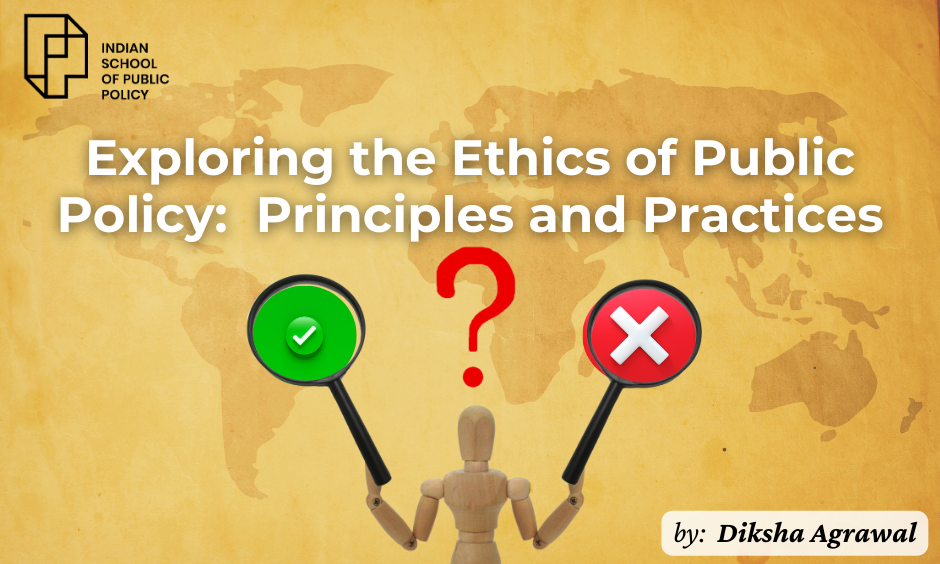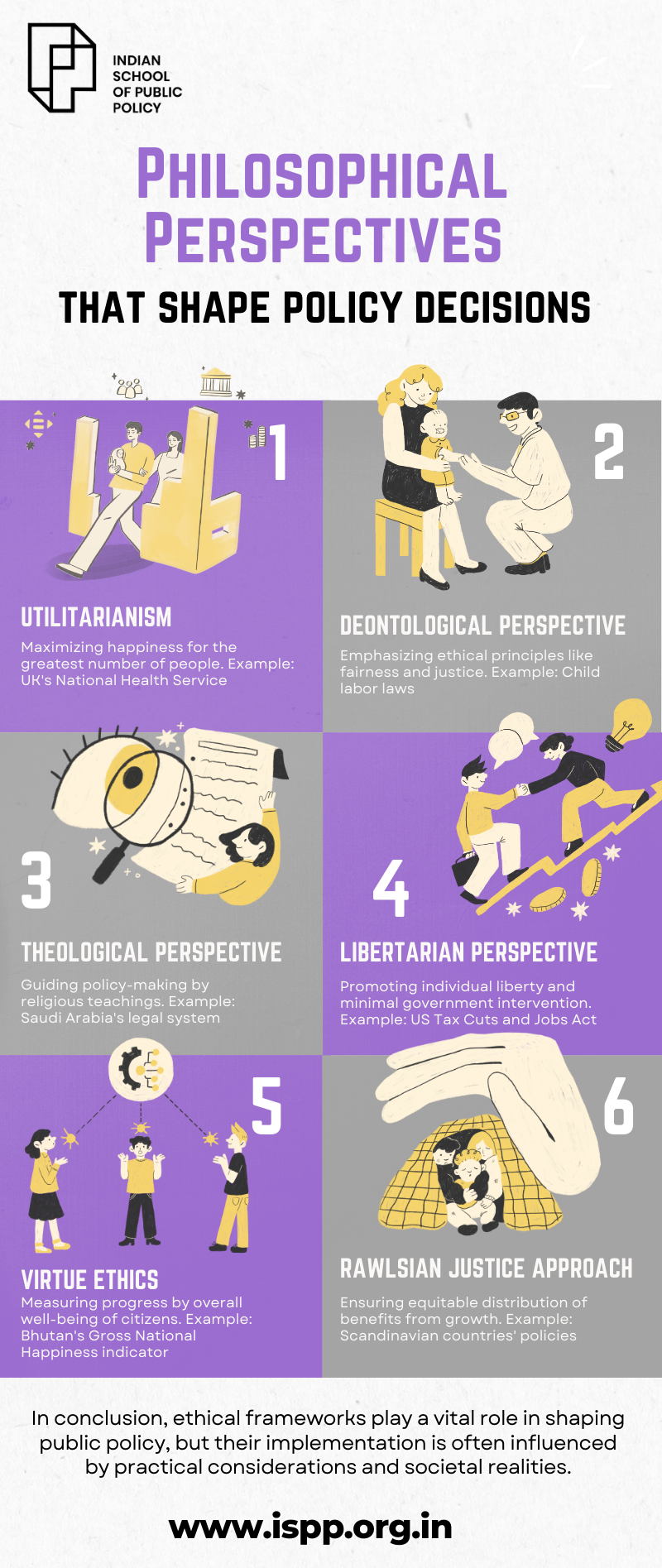Table of Contents
Exploring the Ethics of Public Policy: Principles and Practices

Different philosophers have had varying views on the ethical dimensions of public policy. Utilitarians believe that an ethical policy creates happiness for the majority of people, whereas theological views attach religious or moral values to the idea of what constitutes ethical public policy. The blog will aim to explore the connection between ethics and public policy and focus on two main questions:
- What should be the goals of public policy?
- How do we handle the complex ethical challenges that arise in policymaking?
Let us first discuss the goals of public policies. What should public policies aim to achieve?
Different governments and societies have developed their own unique frameworks to set their goals regarding policy decisions. Various philosophical perspectives have often influenced it. Let us look at a few examples:
- Utilitarianism, as a philosophy, is based on the principle that a decision is right if it benefits and provides happiness to the maximum number of people in a society. For example, the UK’s National Health Service is rooted in utilitarianism as it aims to maximise overall health benefits for the greatest number of people with finite resources. It is contrary to the deontological approach of the individual doctor-patient interaction, where each doctor wants to do their best for each single patient, mostly oblivious to the needs of everyone else.
- Deontological Perspective: This approach is influenced by deontological principles, which emphasise ethical considerations like fairness and justice. For example, the child labour laws of most countries are based on the principle that children need to be protected from exploitation. It is based on the deontological perspective that it is the moral duty of nations to protect children and safeguard their well-being over and above any potential economic benefit.
- Theological Perspective: In this approach, policy-making is guided by religious teachings and beliefs. Saudi Arabia’s legal system heavily incorporates religious teachings into public policy framed to govern criminal justice, family, and commerce.
- Libertarian Perspective: This approach emphasises minimal government intervention and protection of individual liberty and freedom. The United States “Tax Cuts and Jobs Act of 2017” is an example of this approach. The law reduced corporate tax rates and lowered individual income tax rates to reduce the government’s role in economic decisions. It gave businesses greater control over their finances, promoting individual liberty and economic freedom.
- Virtue Ethics: In this approach, progress is measured not in terms of economic growth but in terms of the overall well-being of citizens: their psychological well-being, health, education, etc. Bhutan has led the world in moving beyond the parochial understanding of progress, adopting the Gross National Happiness indicator as a true measure of success. They have reflected a commitment to virtue-based measures of success.
- Rawlsian justice approach: John Rawl’s theory of justice, fairness, and equality influences the formulation of public policy in this approach. The approach emphasises the need for the benefits of growth to be shared equally in society. This approach heavily influences Scandinavian countries like Sweden and Norway.
These examples highlight how different ethical frameworks influence public policy across various countries and systems, reflecting diverse values and priorities in addressing societal challenges.
Countries try to balance these philosophical perspectives with practical considerations when they engage in policymaking. The relationship between ethics and public policy is not as simple as it may appear initially. It is complex and multifaceted, shaped by the need to balance philosophy with practical considerations. What can help us explain this better than the pandemic that hit the world in 2020?
ETHICAL CHALLENGES in PANDEMIC POLICY DEVELOPMENT
The COVID-19 pandemic exposed the ethical challenges in policymaking. Since COVID-19 was a high-stakes challenge, policies were framed rapidly to curtail infection from spreading and save as many lives as possible. Countries started coming up with travel restrictions, vaccinations, and quarantine rules. The ethical dimension of such a move was to protect public health and equitable access to care and resources. However, in reality, one often witnesses ethical considerations being compromised. For example, the implementation of visitation bans in care facilities, while intended to protect residents from infection, led to unintended consequences of increased isolation and mental health issues for the patient. Economic and political factors sometimes influence resource allocation and prioritisation decisions rather than public health considerations. It eroded trust in the idea that policies serve the public good. The urgency of the pandemic required swift action, but this led to a situation where some nations came up with policies that were not well considered from an ethical perspective. Some countries received a lot of flak for issues related to transparency in information disclosure, freedom of speech, treatment of healthcare workers, and human rights in general. The pandemic underscored the complex relationship between ethics and public policy; It helped governments understand the need to balance rapid decision-making with thoughtful considerations.
WAY FORWARD
- Make policy-making a democratic process. Different stakeholders may have diverse ethical perspectives, and engaging with these perspectives may help ensure that policies are well-rounded and consider multiple viewpoints
- Government officials often face ethical dilemmas about their loyalty to their political leaders versus the larger good of society. They must learn to balance loyalty to leaders with their responsibility to provide honest advice
- Ethical considerations should evaluate policies’ immediate, short-term, and long-term impacts. This will help understand how policies affect current and future generations and address the unintended consequences of policy
- Relying heavily on ethical theories without practical considerations can be problematic. Hence, a balance is needed to reconcile ethical theory with practical realities.
Ethical public policy is not solely about adhering to a single philosophical perspective but about integrating multiple approaches to address society’s complex needs. By incorporating these strategies, policymakers can better navigate the ethical dimensions of their decisions and craft policies that more effectively balance the diverse needs and values of the populations they serve.
Register your Interest to Study at ISPP
Infographics

Register your Interest to Study at ISPP
References
- Boston, J., Bradstock, A., & Eng, D. (n.d.). Ethics and public policy. Jstor. https://www.jstor.org/stable/pdf/j.ctt24h2rv.5.pdf?refreqid=fastly-default%3Af0902289bf2f58b8a3e85a6ad713c30a&ab_segments=&origin=&initiator=&acceptTC=1
- www.parliament.uk. (2010, November). https://publications.parliament.uk/pa/cm201011/cmselect/cmhealth/513/513we11.htm
- Daniel, K., & Patrick, S. (2021). Child Labour Ethics through the Prism of Utilitarianism and Deontology. OALib, 08(02), 1–14. https://doi.org/10.4236/oalib.1107140
- Holahan, T., & Bardakh, A. (2024). Clear as Mud: The Dynamic Relationship Between Ethics and Public Policy. Caring for the Ages, 25(1). https://www.caringfortheages.com/article/S1526-4114(23)00473-0/fulltext




